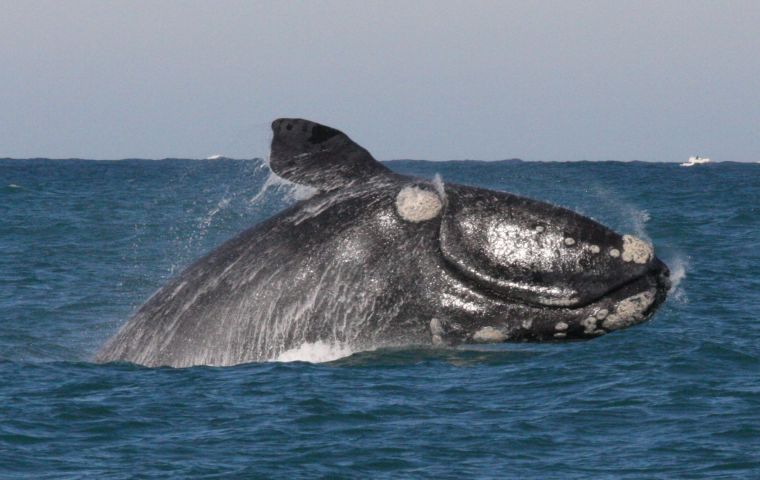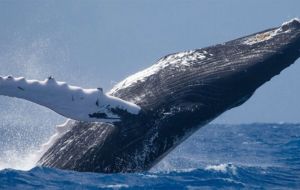MercoPress. South Atlantic News Agency
Southern right whales at South Georgia acoustic messages, BAS Project report
 A pod of southern right whales, well known for their low intensity upcall and their high intensity broadband gunshot
A pod of southern right whales, well known for their low intensity upcall and their high intensity broadband gunshot Scientists from British Antarctic Survey (BAS), Scottish Association for Marine Science (SAMS), and international collaborators have this week published the first detailed research on the sounds made by southern right whales on their high latitude feeding grounds at South Georgia.
The BAS South Georgia Wild Water Whales Project used acoustic listening devices to record and describe southern right whales’ call repertoire, directly linking their calls to visual sightings of the whales. In addition to describing southern right whale calls, the team compared their calls to those of the humpback whales they also recorded.
Lead author and whale ecologist, Dr. Susannah Calderan from SAMS, explains: “This is an important study. Telling the two species apart by their calls can be difficult, but is needed to enable acoustic recorders in the Southern Hemisphere to remotely monitor each species”.
The southern right whale vocalizations recorded by the team showed little variation in call type – they were either the characteristic “upcall”, a low frequency sound believed to be used by all age and sex classes as a contact call, or the high-intensity, broadband “gunshot” call, thought to primarily be part of mating behavior. Southern right whale calls could be distinguished from those of humpback whales based on their frequency characteristics and duration.
Co-author and whale ecologist, Dr Jennifer Jackson of BAS, said that with South Georgia waters designated as a Marine Protected Area by the Government of South Georgia and the South Sandwich Islands, ”we hope our research can continue to contribute to effective management of the area. Not only that, the results of this work will be useful for future acoustic studies on sub-Antarctic and Antarctic whale feeding grounds to improve knowledge of the distribution of southern right and humpback whales at different times of year.”
This research collaboration involved the following institutes: British Antarctic Survey, Scottish Association for Marine Science, University of St Andrews, Cooperative Institute for Climate, Ocean, & Ecosystem Studies, Federal University of Juiz de Fora (Brazil), International Fund for Animal Welfare, University of Southern Denmark, Instituto Aqualie, the National Oceanic and Atmospheric Administration, Australian Antarctic Division and the University of Auckland.
Led by the British Antarctic Survey, the South Georgia Wild Water Whales project has been funded by an EU BEST Medium grant, the Darwin Initiative, South Georgia Heritage Trust, Friends of South Georgia Island and the World Wildlife Fund, with support from the Government of South Georgia and the South Sandwich Islands.





Top Comments
Disclaimer & comment rulesCommenting for this story is now closed.
If you have a Facebook account, become a fan and comment on our Facebook Page!